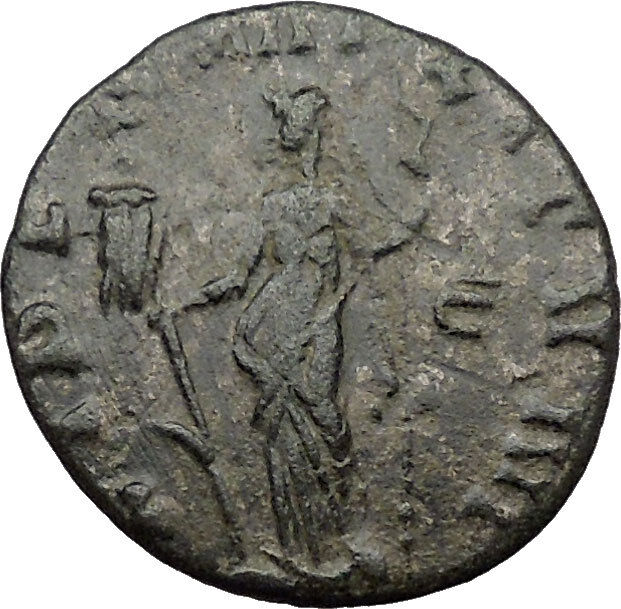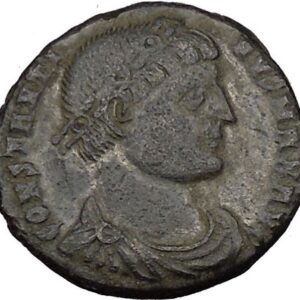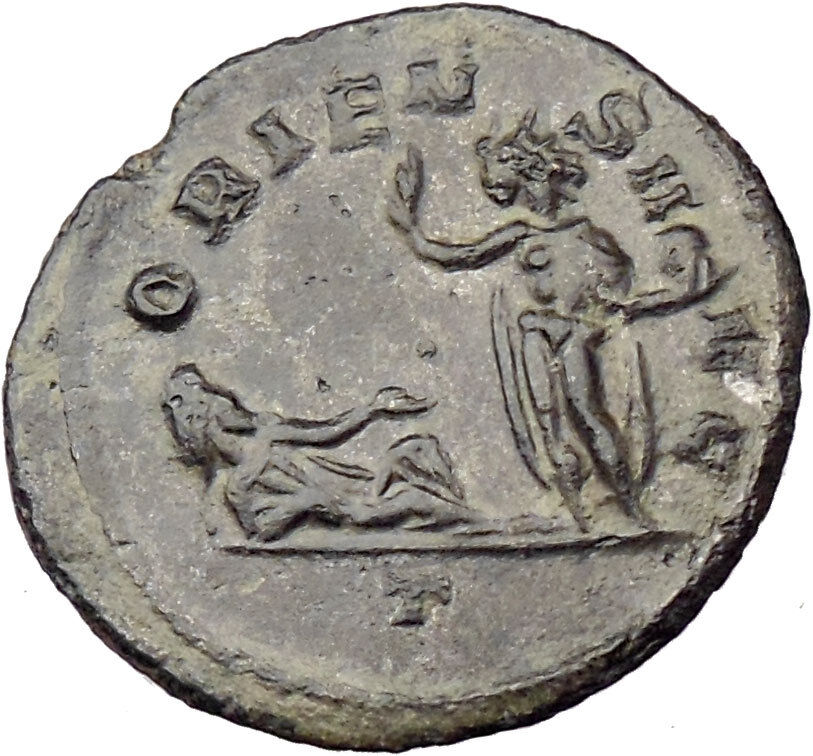|
Gordian III –
Roman Emperor
: 238-244 A.D. –
Silver Denarius 19mm (3.95 grams) Struck circa 238-244 A.D.
Reference: RIC 130; RSC 340.
IMP GORDIANVS PIVS FEL AVG, laureate, draped & cuirassed bust right
SECVRITAS PVBLICA, Securitas seated left holding scepter and propping head
on left hand.
You are bidding on the exact
item pictured, provided with a Certificate of Authenticity and Lifetime
Guarantee of Authenticity.
Securitas – Security, as a goddess worshipped by the Romans, is delineated in
a great variety of ways on their imperial coins. She appears for the most part
under the form of a woman in matronly costume; though in some few instances she
is but half clothed, having a veil thrown over the lower extremities. Sometimes
she is quietly seated, as if perfectly at her ease and having nothing to fear.
That is to say, her right or her left elbow rests on her chair, and the hand
supports her head, as in Nero. Or else one of her arms is placed above the head;
an attitude which ancient artists regarded as characteristic of repose. She
holds in one or other of her hands either a sceptre, or a scipio, or the hasta
pura, or a cornucopia, or a patera, or a globe. On some medals there is near her
a lighted altar; on others she stands leaning against, or with her arm upon, a
column or cippus, having sometimes the legs crossed in a tranquil, easy posture,
carrying one of the above-mentioned symbols, or otherwise holding before her a
branch or a crown of olive, or a palm branch. The meaning of these various
attitudes and attributes is on the whole too evident to require explanation.
There are medals of nearly all the emperors (with flagrant inappropriateness to
most of the reigns) from Otho and Vitellius to Constans and Constantius jun.,
which have for the type of their reverses this figure of Security, and present
for their legend the word SECVRITAS, with the addition of the words, AVGVSTI, or
AVGVSTORVM (security of the emperor or of the emperors); ORBIS (security of the
world) ; PVBLICA (public security) ; PERPETVA (perpetual security) ; POPVLI
ROMANI (security of the Roman people) TEMPORVM (of the Times) ; IMPERII (of the
empire) SAECVLI (of the age) ; REPVBLICAE (of the republic), etc.
Marcus Antonius Gordianus Pius (January
20, 225
–
February
11
, 244
),
known in
English
as Gordian III,
 was was
Roman
Emperor
from 238 to 244. Gordian was the son of
Antonia Gordiana
and his father was an unnamed Roman Senator who died before
238. Antonia Gordiana was the daughter of Emperor
Gordian I
and younger sister of Emperor
Gordian II
.
Very little is known on his early life before becoming Roman Emperor. Gordian
had assumed the name of his maternal grandfather in 238.
Following the murder of emperor
Alexander Severus
in Moguntiacum (modern
Mainz
), the
capital of the
Roman province
Germania Inferior
,
Maximinus Thrax
was acclaimed emperor, despite strong opposition of the
Roman senate
and the majority of the population. In response to what was
considered in Rome as a rebellion, Gordian’s grandfather and uncle, Gordian I
and II, were proclaimed joint emperors in the
Africa Province
. Their revolt was suppressed within a month by Cappellianus,
governor of Numidia
and a loyal supporter of Maximinus Thrax. The elder Gordians died,
but public opinion cherished their memory as peace loving and literate men,
victims of Maximinus’ oppression.
Meanwhile, Maximinus was on the verge of marching on Rome and
the Senate elected
Pupienus
and Balbinus
as joint emperors. These senators were not popular men and the population of
Rome was still shocked by the elder Gordian’s fate, so that the Senate decided
to take the teenager Gordian, rename him Marcus Antonius Gordianus as his
grandfather, and raise him to the rank of
Caesar
and imperial heir.
Pupienus
and Balbinus
defeated Maximinus, mainly due to the defection of several
legions
,
namely the
Parthica II
who assassinated Maximinus. But their joint reign was
doomed from the start with popular riots, military discontent and even an
enormous fire that consumed Rome in June 238. On
July 29
,
Pupienus and Balbinus were killed by the
Praetorian guard
and Gordian proclaimed sole emperor.
Rule
Due to Gordian’s age, the imperial government was surrendered
to the aristocratic families, who controlled the affairs of Rome through the
senate. In 240,
Sabinianus
revolted in the African province, but the situation was dealt quickly. In 241,
Gordian was married to Furia Sabinia
Tranquillina
, daughter of the newly appointed praetorian prefect,
Timesitheus
. As chief of the Praetorian guard and father in law of the
emperor, Timesitheus quickly became the de facto ruler of the Roman
empire.
In the 3rd century, the Roman frontiers weakened against the
Germanic tribes across the
Rhine
and
Danube
, and the
Sassanid
kingdom across the
Euphrates
increased its own attacks. When the Persians under
Shapur I
invaded Mesopotamia
, the young emperor opened the doors of the
Temple of Janus
for the last time in Roman history, and sent a huge army to
the East. The Sassanids were driven back over the Euphrates and defeated in the
Battle of Resaena
(243). The campaign was a success and Gordian, who had
joined the army, was planning an invasion of the enemy’s territory, when his
father-in-law died in unclear circumstances. Without Timesitheus, the campaign,
and the emperor’s security, were at risk.
Marcus Julius Philippus, also known as
Philip the Arab
, stepped in at this moment as the new Praetorian Prefect and
the campaign proceeded. In the beginning of 244, the Persians counter-attacked.
Persian sources claim that a battle was fought (Battle
of Misiche) near modern
Fallujah
(Iraq)
and resulted in a major Roman defeat and the death of Gordian III[1].
Roman sources do not mention this battle and suggest that Gordian died far away,
upstream of the Euphrates. Although ancient sources often described Philip, who
succeeded Gordian as emperor, as having murdered Gordian at Zaitha (Qalat es
Salihiyah), the cause of Gordian’s death is unknown.
Gordian’s youth and good nature, along with the deaths of his
grandfather and uncle and his own tragic fate at the hands of another usurper,
granted him the everlasting esteem of the Romans. Despite the opposition of the
new emperor, Gordian was deified by the Senate after his death, in order to
appease the population and avoid riots.
|





 was
was


